Mises, Ludwig von. Human Action: A Treatise on Economics
Подождите немного. Документ загружается.

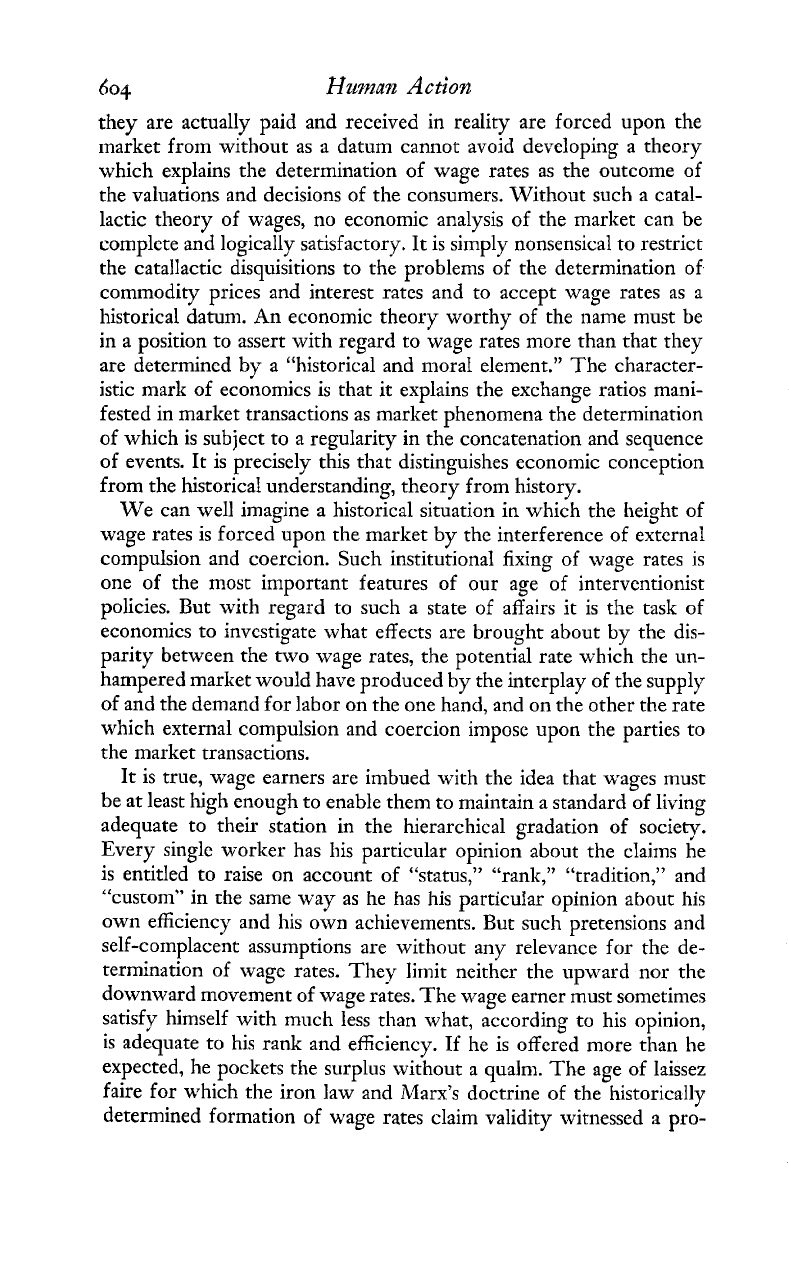
604
Human
Action
they are actually paid and received in reality are forced upon the
~narket from without as a datum cannot avoid developing a theory
which explains the determination of wage rates as the outcome of
the valuations and decisions of the consumers. Without such a catal-
lactic theory of wages, no economic analysis of the market can be
complcte and logically satisfactory. It is simply nonsensical to restrict
the catallactic disquisitions to the problems of the determination of
commodity prices and interest rates and to accept wage rates as a
historical datum. An economic theory worthy of the name must be
in a position to assert with regard to wage rates more than that they
are determined by a "historical and moral element." The character-
istic mark of economics is that it explains the exchange ratios mani-
fested in market transactions as market phenomena the determination
of which is subject to a regularity in the concatenation and sequence
of events. It is precisely this that distinguishes economic conception
from the historical understanding, theory from history.
We can well imagine
a
historical situation in which the height of
wage rates is forced upon the market by the interference of external
compulsion and coercion. Such institutional fixing of wage rates is
one of the most important features of our age of interventionist
policies. But with regard to such a state of affairs it is the task of
econon~ics to investigate what effects are brought about by the dis-
parity between the two wage rates, the potential rate which the
un-
hampered market would have produced by the interplay of the supply
of and the demand for labor on the one hand, and on the other the rate
which external compulsion and coercion impose upon the parties to
the market transactions.
It is true, wage earners are imbued with the idea that wages must
be at least high enough to enable them to maintain a standard of living
adequate to their station in the hierarchical gradation of society.
Every single worker has his particular opinion about the claims he
is entitled to raise on account of "status," "rank," "tradition," and
"cuscom" in the same way as he has his particuiar opinion about his
own efficiency and his own achievements. But such pretensions and
self-complacent assumptions are without any relevance for the de-
termination of wage rates. They limit neither the upward nor the
downward movement of wage rates. The wage earner must sometimes
satisfy himself with much less than what, according to his opinion,
is adequate to his rank and efficiency. If he is offercd more than he
expected, he pockets the surplus without a qualm. The age of laissez
faire for which the iron law and Marx's doctrine of the historically
determined formation of wage rates claim validity witnessed a pro-
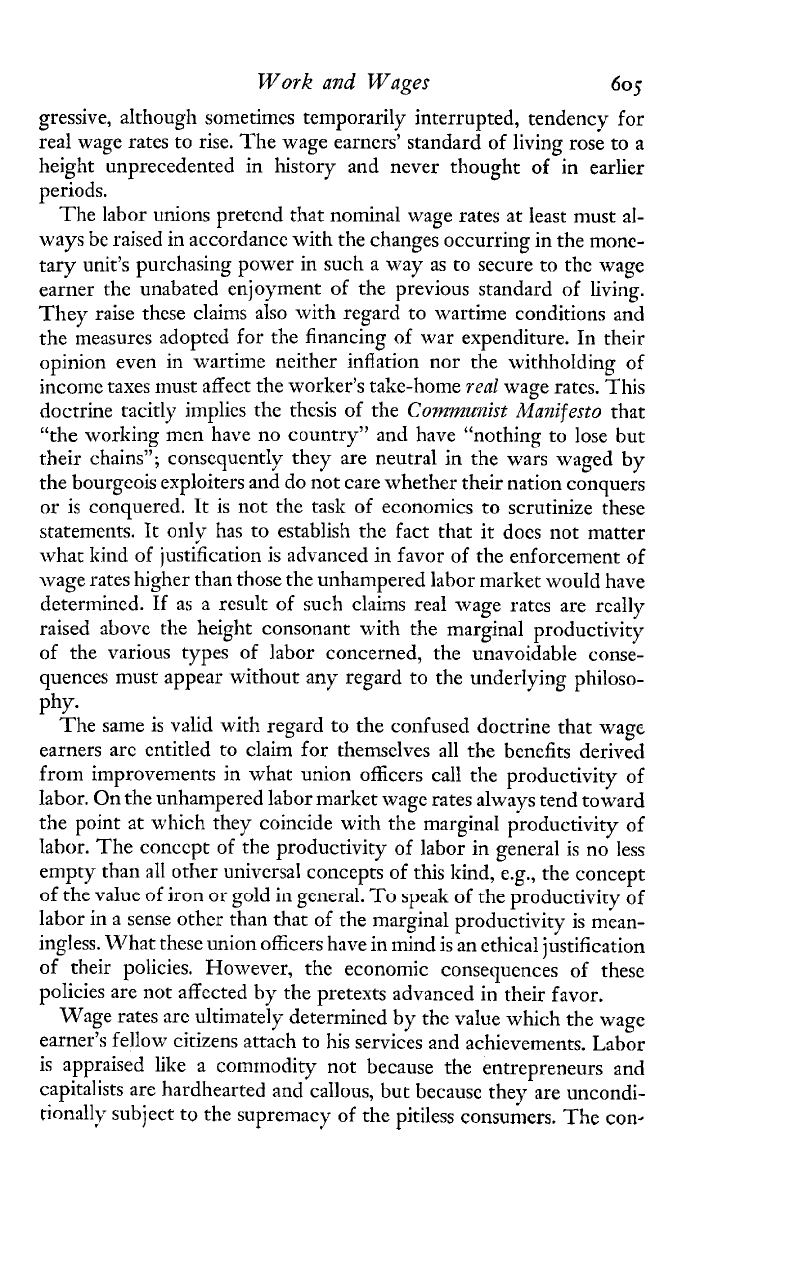
Work
and
Wages
605
gressive, although sometimes temporarily interrupted, tendency for
real wage rates to rise. The wage earners' standard of living rose to
a
height unprecedented in history and never thought of in earlier
periods.
The labor unions pretend that nominal wage rates at least must al-
ways be raised in accordance with the changes occurring in the mone-
tary unit's purchasing power in such a way as to secure to the wage
earner the unabated enjoyment of the previous standard of living.
They raise these claims also with regard to wartime conditions and
the measures adopted for the financing of war expenditure. In their
even in wartime neither inflation nor the withholding of
incorne taxes must affect. the worker's take-home
real
wage rates. This
doctrine tacitly implies the thesis of the
Co~nmzcnist Manifesto
that
"the working men have no country" and have "nothing to lose but
their chains"; consequently they are neutral in the wars waged by
the bourgeois exploiters and do not care whether their nation conquers
or is conquered. It is not the task of economics to scrutinize these
statements.
It
only has to establish the fact that it does not matter
what kind of justification is advanced in favor of the enforcement of
wage rates higher than those the unhampered labor market would have
determined. If as a result of such claims real wage rates are really
raised above the height consonant with the marginal productivity
of the various types of labor concerned, the unavoidable conse-
quences must appear without any regard to the underlying philoso-
phy-
The same is valid with regard to the confused doctrine that wage
earners arc entitled to claim for themselves all the benefits derived
frotn inlprovements in what union officers cal the productivity of
labor. On the unhampered labor market wage rates always tend toward
the point at which they coincide with the marginal productivity of
labor. The concept of the productivity of labor in general is no less
empty than all other universal concepts of this kind, e.g., the concept
of
ihe
vahe of iron or
gold
iii
general.
TO
yak
of &e productivity of
labor in a sense other than that of the marginal productivity is mean-
ingless. What these union officers have in mind is an ethical justification
of their policies. However, the economic consequences of these
policies are not affected by the pretexts advanced in their favor.
Wage rates are ultimately determined by the value which the wage
earner's fellow citizens attach to his services and achievements. Labor
is appraised like a commodity not because the entrepreneurs and
capitalists are hardhearted and callous, but because they are uncondi-
tionally subject to the supremacy of the pitiless consumers. The con-
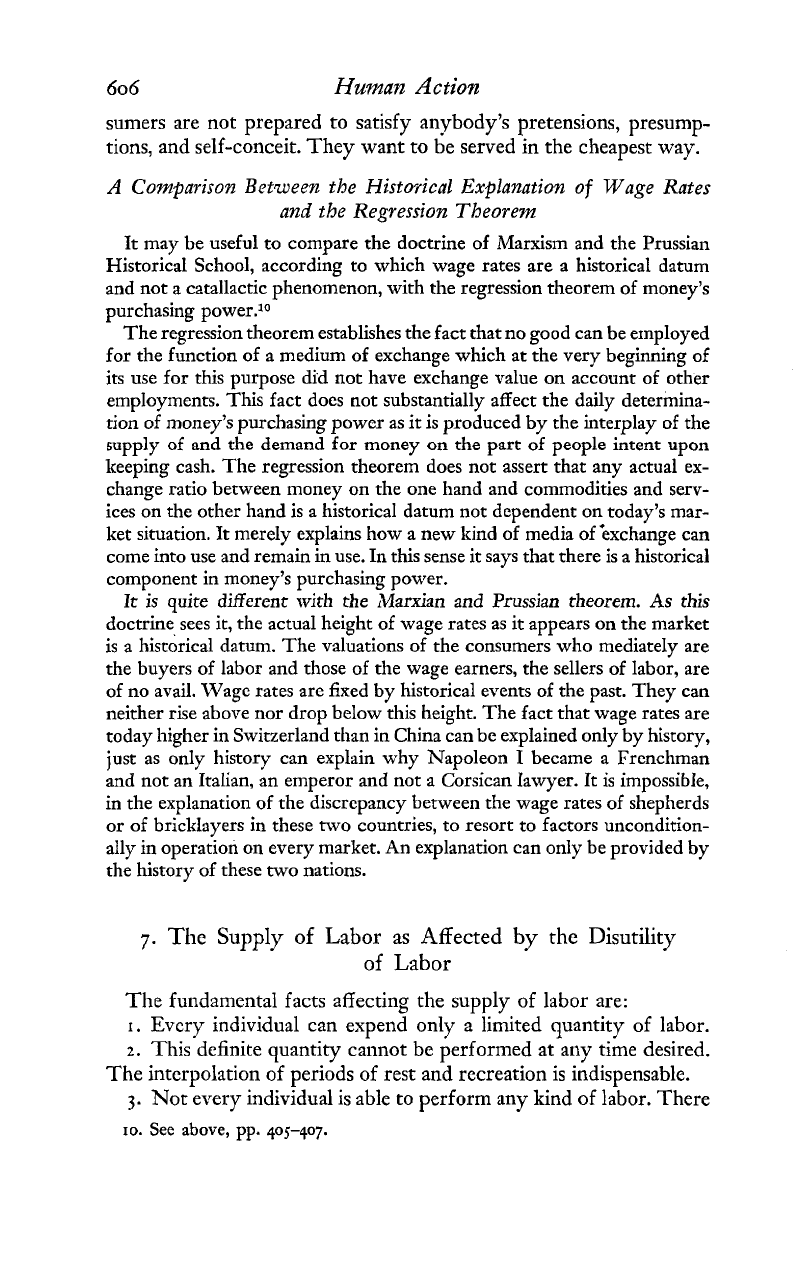
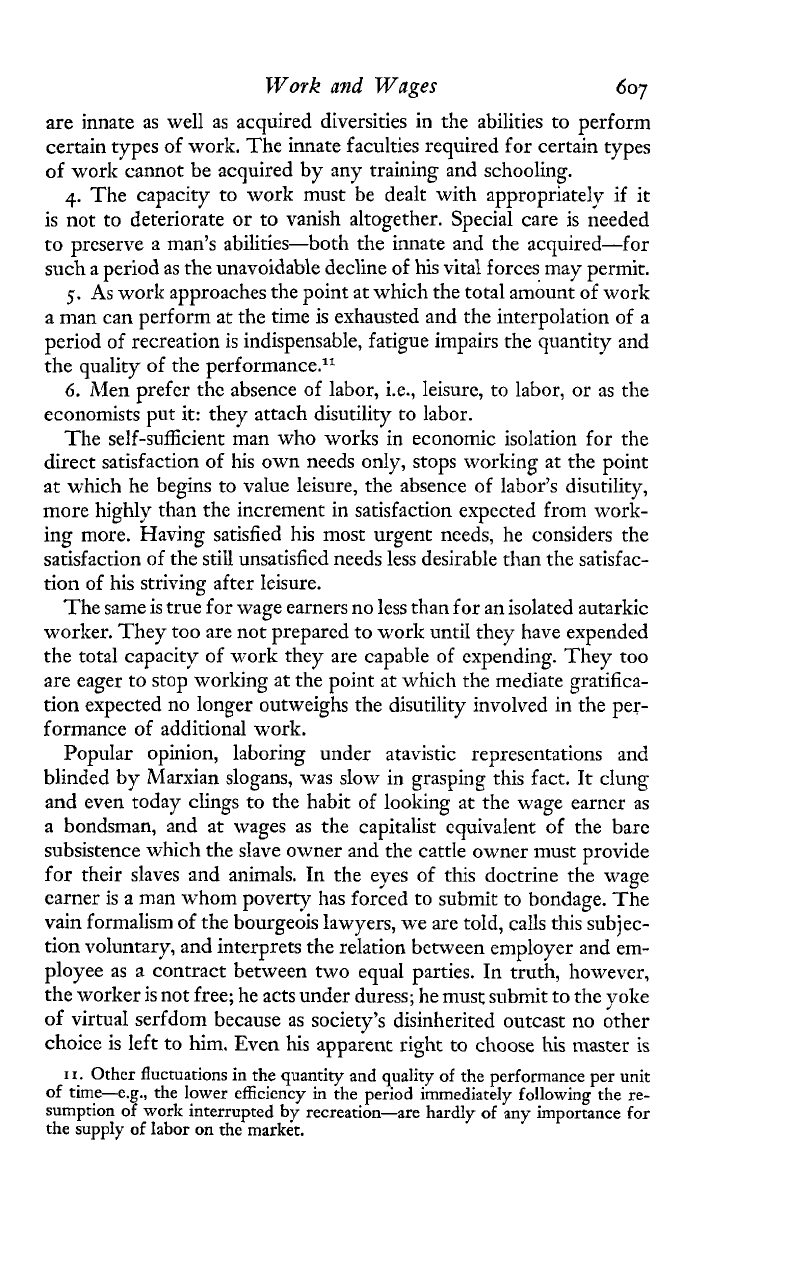
Work
and
Wages
are innate as well as acquired diversities in the abilities to perform
certain types of work. The innate faculties required for certain types
of work cannot be acquired by any training and schooling.
4.
The capacity to work must be dealt with appropriately if it
is not to deteriorate or to vanish altogether. Special care is needed
to preserve a man's abilities-both the innate and the acquired-for
such a ~eriod as the unavoidable decline of his vital forces may permit.
5.
As work approaches the point at which the total amount of work
a man can perform at the time is exhausted and the interpolation of a
period of recreation is indispensable, fatigue impairs the quantity and
the quality of the performance.lL
6.
Men prefer the absence of labor, i.e., leisure, to labor, or as the
economists put it: they attach disutility to labor.
The self-sufficient man who works in economic isolation for the
direct satisfaction of his own needs only, stops working at the point
at which he begins to vaIue leisure, the absence of labor's disutility,
more highly than the increment in satisfaction expected from work-
ing more. Having satisfied his most urgent needs, he considers the
satisfaction of the still unsatisfied needs less desirable than the satisfac-
tion of his striving after leisure.
The same is true for wage earners no less than for an isolated autarkic
worker. They too are not prepared to work untiI they have expended
the total capacity of work they are capabIe of expending. They too
are eager to stop working at the point at which the mediate gratifica-
tion expected no longer outweighs the disutility involved in the per-
formance of additional work.
Popular opinion, laboring under atavistic representations and
blinded
by
Marxian slogans, was slow in grasping this fact. It clung
and even today clings to the habit of looking at the wage earner as
a bondsman, and at wages as the capitalist equivalent of the bare
subsistence w-hich the slave owner and the cattle owner must provide
for their slaves and animals. In the eyes of this doctrine the wage
earner is a man whom poverty has forced to submit to bondage. The
vain formalism of the bourgeois lawyers, we are told, calls this subjec-
tion voluntary, and interprets the relation between employer and em-
ployee as a contract between two equal parties. In truth, however,
the worker is not free; he acts under duress; he must submit to the yoke
of virtual serfdom because as society's disinherited outcast no other
choice is left to him. Even his apparent right to choose his master
is
I
I.
Other fluctuations in the quantity and quality of the performance per unit
of time-e.g., the lower efficiency
in
the period immediately following the re-
sumption of work interrupted by recreation-are hardly of any importance for
the supply of labor on the market.
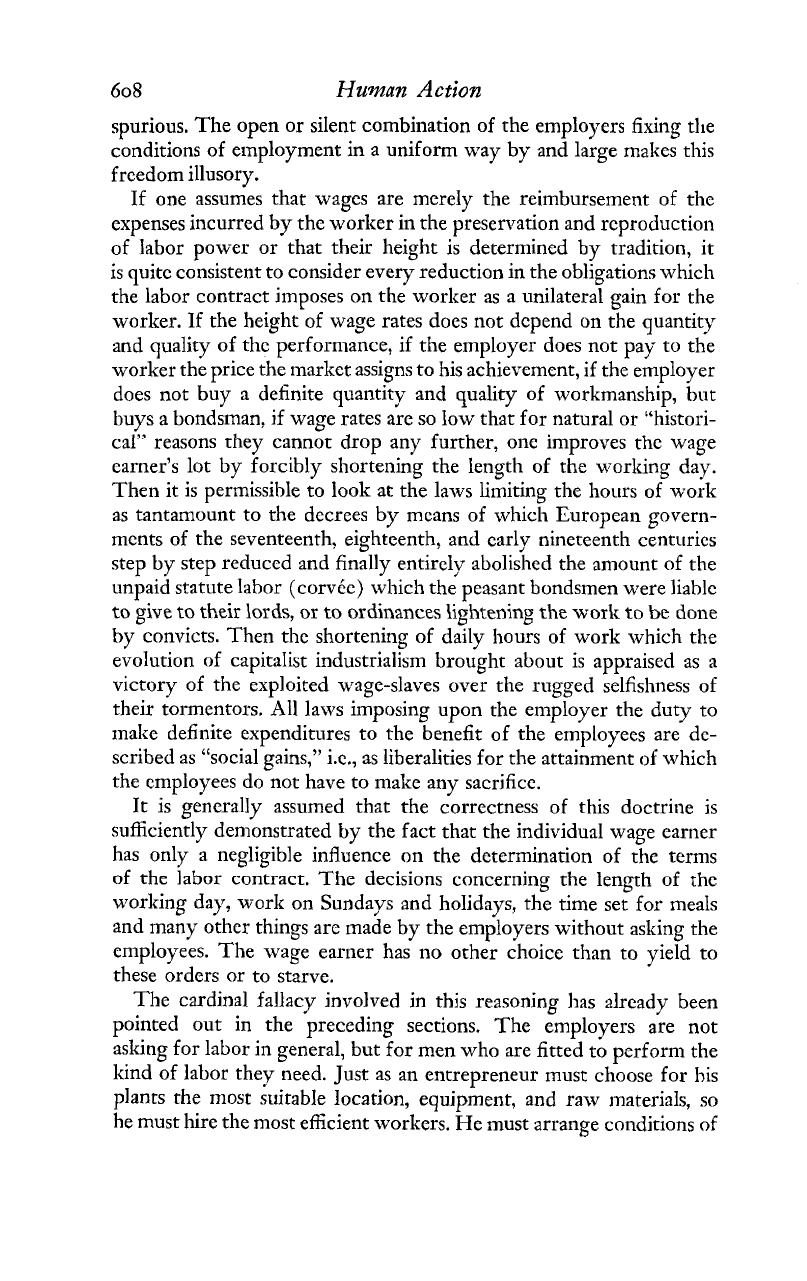
Human
Action
spurious. The open or silent combination of the employers fixing the
conditions of employment in a uniform way by and large makes this
freedom illusory.
If one assumes that wages are merely the reimbursement of the
expenses incurred by the worker in the preservation and reproduction
of labor power or that their height is determined by tradition, it
is quite consistent to consider every reduction in the obligations which
the labor contract imposes on the worker as a unilateral gain for the
worker. If the height of wage rates does not depend on the quantity
and quality of the performance, if the employer does not pay to
thk
worker the price the market assigns to his achievement, if the employer
does not buy a definite quantity and quality of workmanship, but
buys a bondsman, if wage rates are so low that for natural or "histori-
cal" reasons they cannot drop any further,
one
improves the wage
earner's lot by forcibly shortening the length of the working day.
Then it is permissible to look at the laws limiting the hours of work
as tantamount to the decrees by means of which European govern-
ments of the seventeenth, eighteenth, and early nineteenth centuries
step by step reduced and finally entirely abolished the amount of the
unpaid statute labor (corv6e) which the peasant bondsmen were liable
to
give to their lords, or to ordinances
lightening
the
work
to be done
by convicts. Then the shortening of daily hours of work which the
evolution of capitah industrialism brought about is appraised as a
victory of the exploited wage-slaves over the rugged selfishness of
their tormentors. All laws imposing upon the employer the duty to
make definite expenditures to the benefit of the
employees
are de-
scribed as "social gains," i.c., as liberalities for the attainment of which
the employees do not have to make any sacrjfice.
It is generally assumed that the correctness of this doctrine is
sufficiently demonstrated by the fact that the individual wage earner
has only a negligible influence on the determination of the terms
of the labor contract. The decisions concerning the length of the
working day, work on Sundays and holidays, the time set for meals
and many other things arc made by the employers without asking the
employees. The wage earner has no other choice than to yield to
these orders or to starve.
The cardinal fallacy involved in this reasoning has already been
pointed out in the preceding sections. The employers are not
asking for labor in general, but for men who are fitted to perform the
kind of labor they need. Just as an entrepreneur must choose for his
plants the most suitable location, equipment, and raw materials, so
he must hire the most efficient workers. He must arrange conditions of
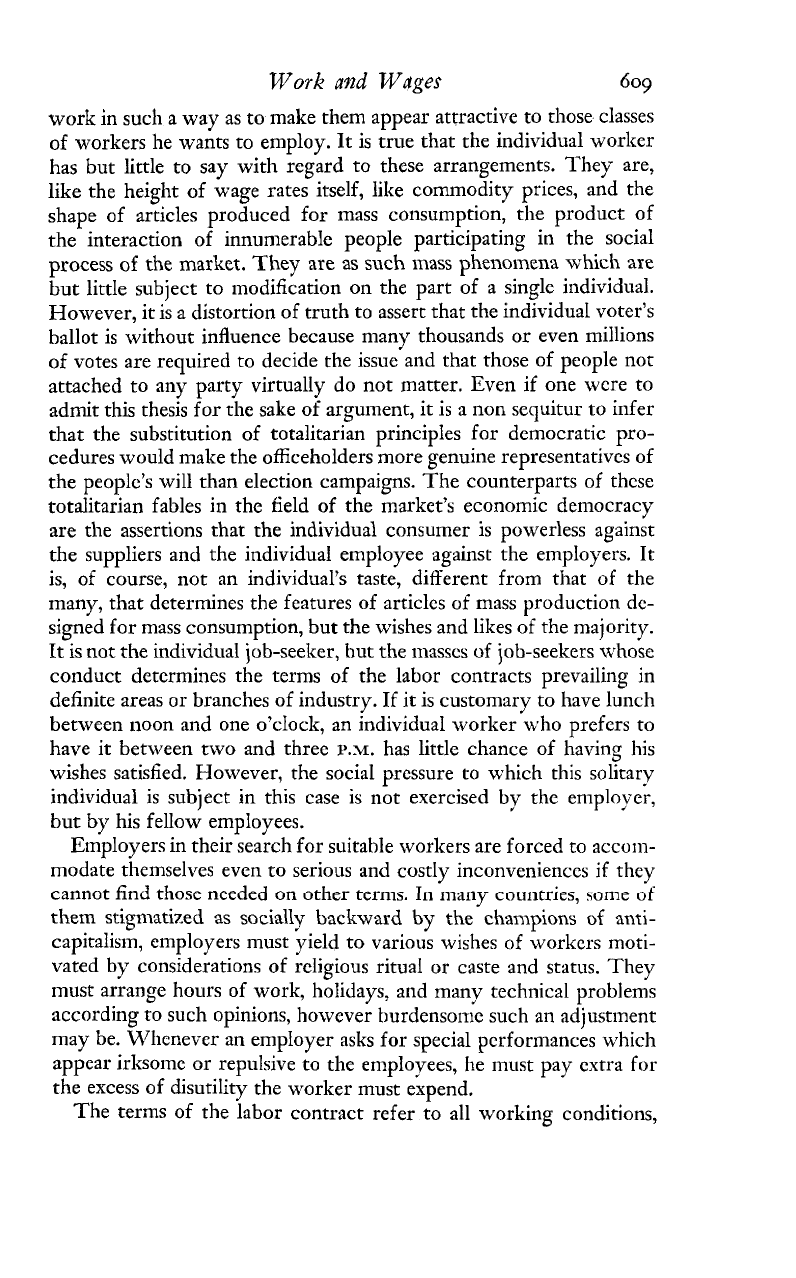
Work
and
Wages
work in such a way as to make them appear attractive to those classes
of workers he wants to employ. It is true that the individual worker
has but little to say with regard to these arrangements. They are,
like the height of wage rates itself, like commodity prices, and the
shape of articles produced for mass consumption, the product of
the interaction of innumerable people participating in the social
process of the market. They are as such mass phenomena which are
but little subject to modification on the part of a single individual.
However, it is a distortion of truth to assert that the individuaI voter's
ballot is without influence because many thousands or even millions
of votes are required to decide the issue and that those of people not
attached to any party virtually do not matter. Even if one wcre to
admit this thesis for the sake of argument, it is a non sequitur to infer
that the substitution of totalitarian principles for democratic pro-
cedures would make the officeholders more genuine representatives of
the people's will than election campaigns. The counterparts of these
totalitarian fables in the field of the market's economic democracy
are the assertions that the individual consumer is powerless against
the suppliers and the individual employee against the employers. It
is, of course, not an individual's taste, different from that of the
many, that determincs the features of articles of mass production de-
signed for mass consumption, but the wishes and likes of the majority.
It is not the individual job-seeker, but the masses of job-seekers whose
conduct determines the tcrms of the labor contracts prevailing in
definitc areas or branches of industry. If it is customary to have lunch
between noon and one o'cIock, an individual worker who prefers to
have it between two and three
P.M.
has little chance of having his
wishes satisfied. However, the social prcssure to which this solitary
individual is subject in this case
is
not exercised by the employe;,
but by his fellow employees.
Employers in their search for suitable workers are forced to accorn-
modate themselves even to serious and costly inconveniences if they
cannot find those nceded on other terms. In many countries, some of
them stigmatized as socially backward
by
the
champions
of
anti-
capitalism, employers must yield to various wishes of workers moti-
vated by considerations of religious ritual or caste and status. They
must arrange hours of work, holidays, and many technical problems
according to such opinions, however hurdensome such an adjustment
may be. U7hcnever an empbyer asks for special pcrforrnances which
appear irksome or repulsive to the en~ployees, he must pay extra for
the excess of disutility the worker must expend.
The terms of the labor contract refer to all working conditions,
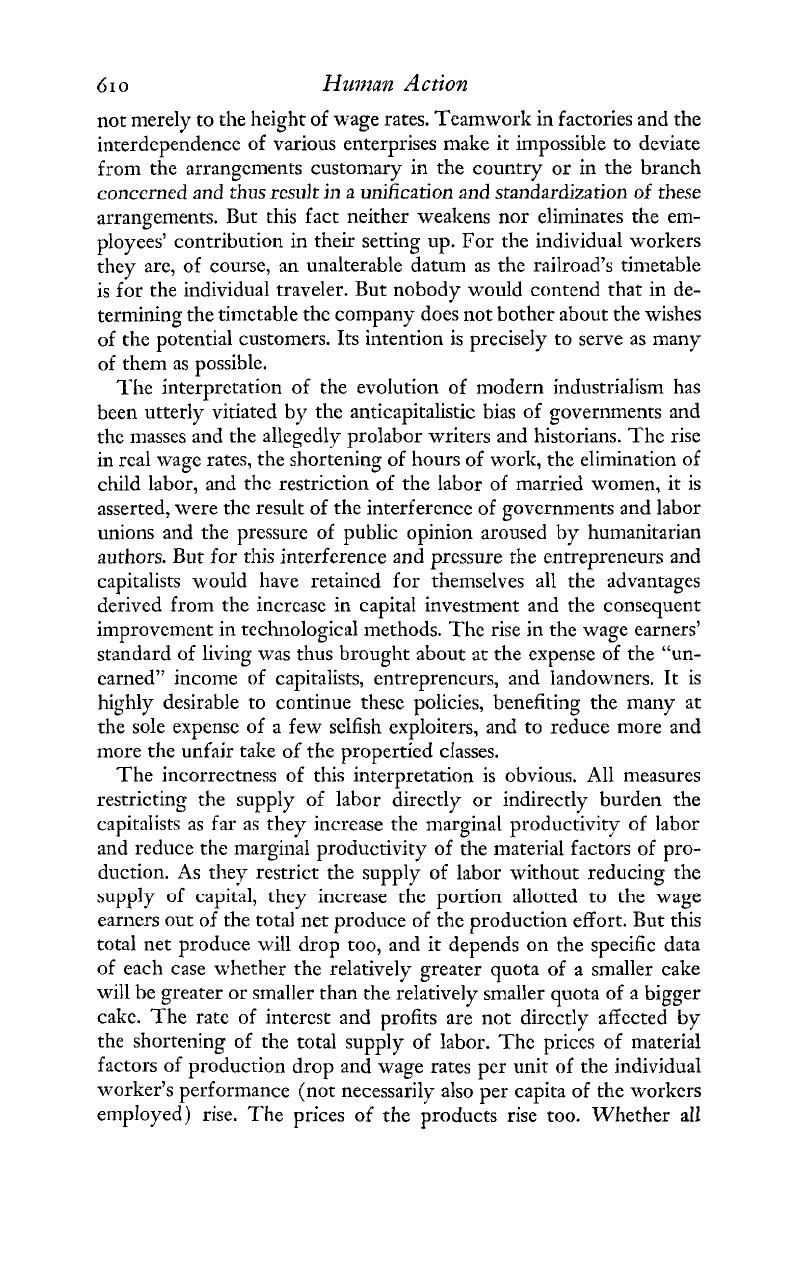
610
Hunzan
Action
not merely to the height of wage rates. Teamwork in factories and the
interdependence of various enterprises make it impossible to deviate
from the arrangcments custonlary in the country or in the branch
concerned and thus result in
a
unification and standardizarion of these
arrangements. But this fact neither weakens nor eliminates the em-
ployees' contribution in their setting up. For the individual workers
they are, of course, an unalterable datum as the railroad's timetable
is for the individual traveler. But nobody would contend that in de-
termining the timetable thc company does not bothcr about the wishes
of the potential customers. Its intention is precisely to serve as many
of them as possible.
The interpretation of the evolution of modern industrialism has
been utterly vitiated by the anticapitalistic bias of governments and
the masses and the allegedly prolabor writers and historians. The rise
in real wage rates, the shortening of hours of work, the elimination of
child labor, and the restriction of the labor of married women, it is
asserted, were the result of the interfercncc of governments and labor
unions and the pressure of public opinion aroused by humanitarian
authors. But for this interference and pressure the entrepreneurs and
capitalists would have retained for themselves all the advantages
derivcd from the increase in capital investment and the consequent
improvement
in technological methods. The rise in the wage earners'
standard of living was thus brought about at the expense of the "un-
earned'' income of capitalists, cntreprencurs, and landowners. It is
highly desirable to continue these policies, benefiting the many at
the sole expense of a few selfish exploiters, and to reduce more and
more the unfair take of the propertied classes.
The incorrectness of this interpretation is obvious. All measures
restricting the supply of labor directly or indirectly burden the
capitalists as far as they increase the marginal productivity of labor
and reduce the marginal productivity of the material factors of pro-
duction. As they restrict the supply of labor without reducing the
supply of capi&l, they increase the portion allotted to the wage
earners out of the total net produce of the production effort. But this
total net produce will drop too, and it depends on the specific data
of each case whether the relatively greater quota of a smaller cake
will be greater or smaller than the relatively smaller quota of a bigger
cake. The rate of interest and profits are not directly affected by
the shortening of the total supply of labor. The prices of material
factors of production drop and wage rates per unit of the individual
worker's performance (not necessarily also per capita of the workers
employed) rise. The prices
of
the products rise too. Whether
all
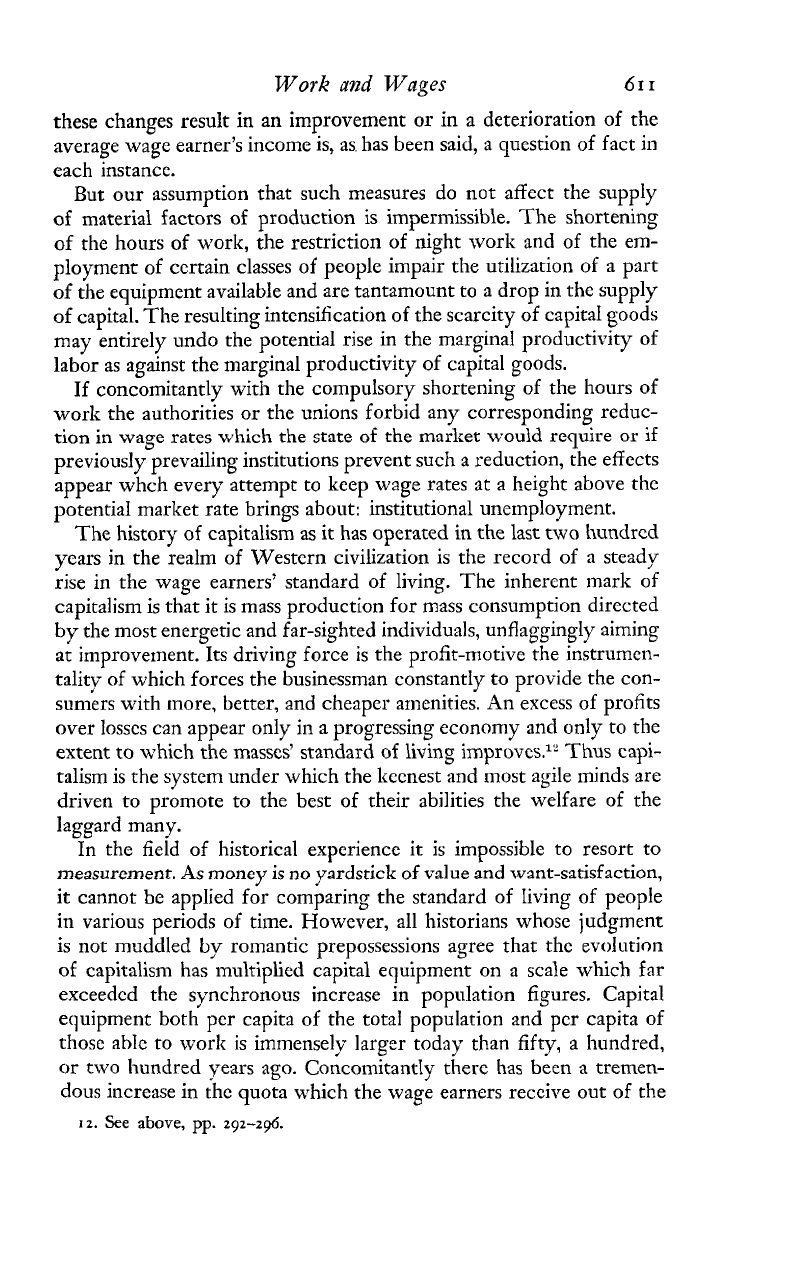
Work
and
Wages
61
I
these changes result in an improvement or in a deterioration of the
average wage earner's income is, as has been said, a question of fact in
each instance.
But our assumption that such measures do not affect the supply
of material factors of production is impermissible. The shortening
of the hours of work, the restriction of night work and of the em-
ployment of certain classes of people impair the utilization of a part
of the equipment available and are tantamount to a drop in the supply
of capital. The resulting intensification of the scarcity of capital goods
may entirely undo the potential rise in the marginal productivity of
labor as against the marginal productivity of capital goods.
If concomitantly with the compulsory shortening of the hours of
work the authorities or the unions forbid any corresponding reduc-
tion
in
wage rates which the state of the market: would require or
if
previously prevailing institutions prevent such a reduction, the effects
appear whch every attempt to keep wage rates at a height above the
potential market rate brings about: institutional unemployment.
The history of capitalism
as
it has operated in the last two t~undred
years in the realm of Western civilization
is
the record of a steady
rise in the wage earners' standard of living. The inhercnt mark of
capitalism is that it is mass production for mass consumption directed
by the most energetic and far-sighted individuals, unflaggingly aiming
at improvement. Its driving force is the profit-motive the instrumen-
tality of which forces the businessman constantly to provide the con-
sumers with more, better, and cheaper amenities. An excess of profits
over losses can appear only in a progressing economy and only to the
extent to which the masses' standard
of
living irnprov~s?~
Thus
capi-
talism is the system under which the keenest and most agile minds are
driven to promote to the best of their abilities the welfare of the
laggard many.
In the field of historical experience it is impossible to resort to
measurement. As money is
no
yardstick of value and want-satisfaction,
it cannot be applied for comparing the standard of Iiving of people
in various periods of time. Howcver, all historians whose judgment
is not muddled by romantic prepossessions agree that the evolution
of capitalism has inultiplied capital equipment on a scale which far
exceeded the synchronous increase in population figures. Capital
equipment both per capita of the total population and pcr capita of
those
abIc
to work is immensely larger today than fifty, a hundred,
or two hundred years ago. ConcomitantIy there has been a tremen-
dous increase in the quota which the wage earners receive out of the
I
2.
See
above,
pp.
292-296.
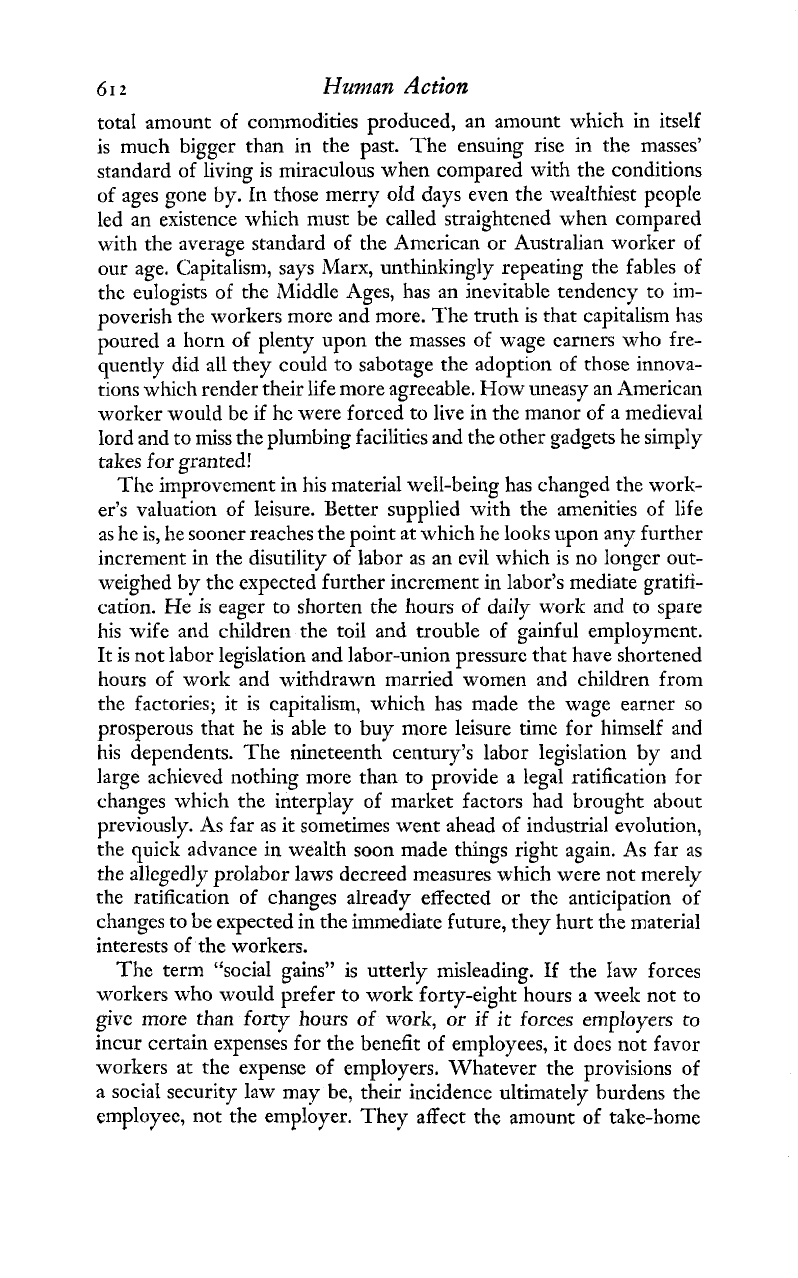
61
2
Hunzan
Action
total amount of commodities produced, an amount which in itself
is much bigger than in the past. The ensuing rise in the masses'
standard of living is miraculous when compared with the conditions
of ages gone by. In those merry old days even the wealthiest people
led an existence which must be called straightened when compared
with the average standard of the American or Australian worker of
our age. Capitalism, says Marx, unthinkingly repeating the fables of
the eulogists of the Middle Ages, has an inevitable tendency to irn-
poverish the workers more and more. The truth is that capitalism has
poured a horn of plenty upon the masses of wage earners who fre-
quently did all they could to sabotage the adoption of those innova-
tions which render their life more agreeable. How uneasy an American
worker would be if hc were forced to live in the manor of a medieval
lord and to miss the plumbing facilities and the other gadgets he simply
takes for granted!
The improvement in his material well-being has changed the work-
er's valuation of leisure. Better supplied with the amenities of life
as he is, he sooner reaches the point at which he looks upon any further
increment in the disutility of labor as an evil which is no longer out-
weighed by the expected further increment in labor's mediate gratiti-
cation. He is eager to shorten the hours of daily work and to spare
his wife and children the toil and trouble of gainful employment.
It is not labor legislation and labor-union pressure that have shortened
hours of work and withdrawn married women and children from
the factories; it is capitalism, which has made the wage earner so
prosperous that he is able to buy more leisure timc for himself arid
his dependents. The nineteenth century's labor legislation by and
large achieved nothing more than to provide a legal ratification for
changes which the interplay of market factors had brought about
previously. As far as it sometimes went ahead of industrial evolution,
the quick advance in wealth soon made things right again. As far as
the allegedly prolabor laws decreed measures which were not rnerely
the ratification of changes already effected or the anticipation of
changes to be expected in the immediate future, they hurt the material
interests of the workers.
The term "social gains" is utterly misleading. If the law forces
workers
who
would prefer to work forty-eight hours a week not to
give more than forty hours of work, or
if
it
forces employers to
incur certain expenses for the benefit of employees, it does not favor
workers at the expense of employers. Whatever the provisions of
a social security law may be, their incidence ultimately burdens the
employee, not the employer. They affect the amount of take-home
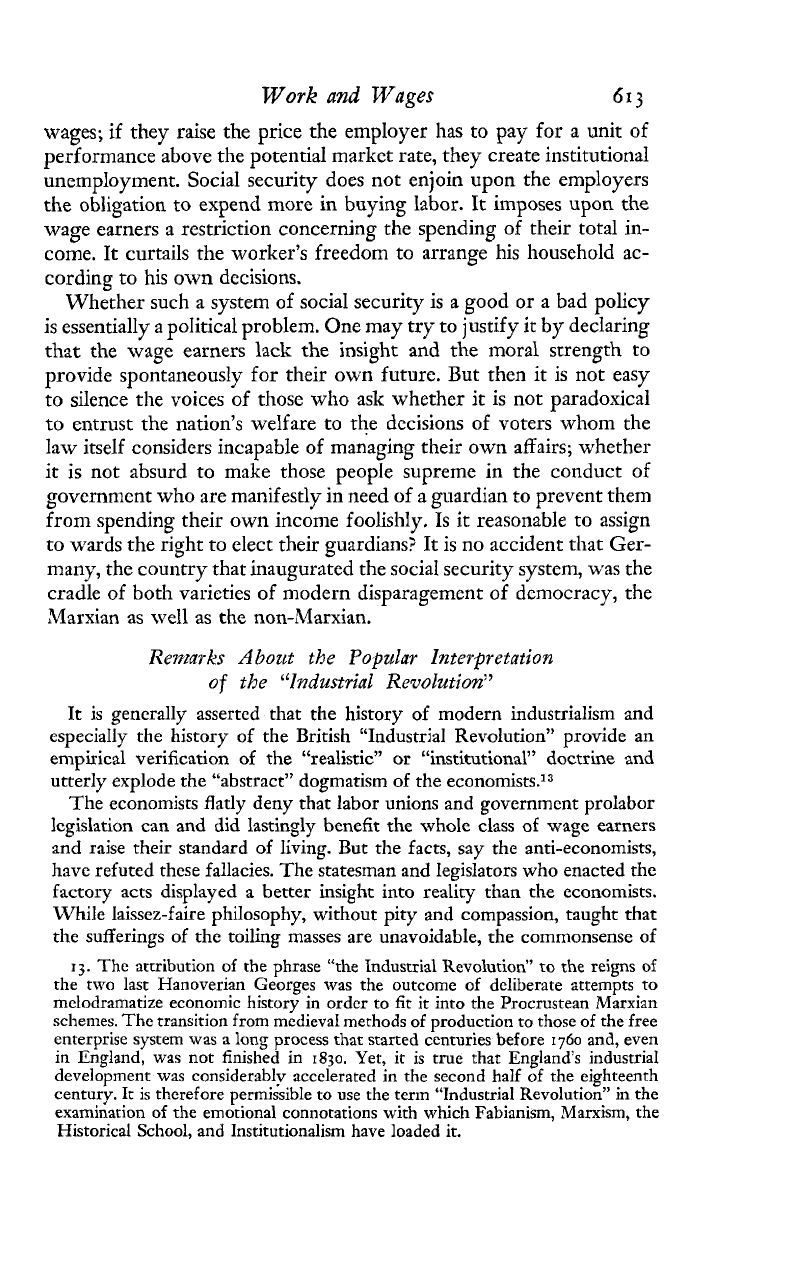
Work
and
Wages
wages; if they raise the price the employer has to pay for a unit of
performance above the potential market rate, they create institutional
unemployment. Social security does not enjoin upon the employers
the obligation to expend more
in
buying labor. It imposes upon the
wage earners a restriction concerning the spending of their total in-
come. It curtails the worker's freedom to arrange his household ac-
cording to his own decisions.
Whether such a system of social security is a good or a bad policy
is essentially a poIitical problem. One may try to justify it by declaring
that the wage earners
lack
the insight and the moral strength to
provide spontaneously for their own future. But then it is not easy
to silence the voices of those who ask whether it is not paradoxical
to entrust the nation's welfare to the decisions of voters whom the
law itself considers incapable of managing their own affairs; whether
it is not absurd to make those people supreme in the conduct of
government who are manifestly in need of a guardian to prevent them
from spending their own income foolishly. Is it reasonable to assign
to wards the right to elect their guardians? It is no accident that Ger-
many,
the country that inaugurated the social security system, was the
cradle of both varicties of modern disparagement of democracy, the
Marxian as
well
as the non-A4arxian.
Rewzarks About the Popular Interpetation
of the "Industrial Revolution"
It is generally asserted that the history of modern industrialism
and
especially the history of the British "Industrial Revolution" provide an
empirical verification of the "realistic" or "institutional" doctrine and
utterly explode the "abstract" dogmatism of the economists.13
The economists flatly deny that labor unions and government prolabor
legislation can and did lastinel benefit the whole class of wage earners
.a
.y
and raise their standard
of
hvmg. But the facts,
say
the anti-economists,
have refuted these fallacies. The statesman and legislators who enacted the
factory acts displayed a better insight into reality than the economists.
While laissez-faire philosophy, without pity and compassion, taught that
the sufferings of the toiling masses
are
unavoidable,
the
commonsense of
I
3.
The attribution of the phrase "the Industrial Revolution" to the reigns of
the two last Hanoverian Georges was the outcome of deliberate attempts to
melodramatize econo~nic history in order to fit it into the Procrustean Marxian
schemes. The transition from medieval methods of production to those of the free
enterprise system was a long process that started centuries before
1760
and, even
in England, was not finished in
1830.
Yet, it is true that England's industrial
development was considerably accelerated in the second half of the eighteenth
century. It is therefore permissible to use the term "Industrial Revolution" in the
examination of the emotional connotations with which Fabianism, Marxism, the
Historical School, and Institutionalism have loaded it.
